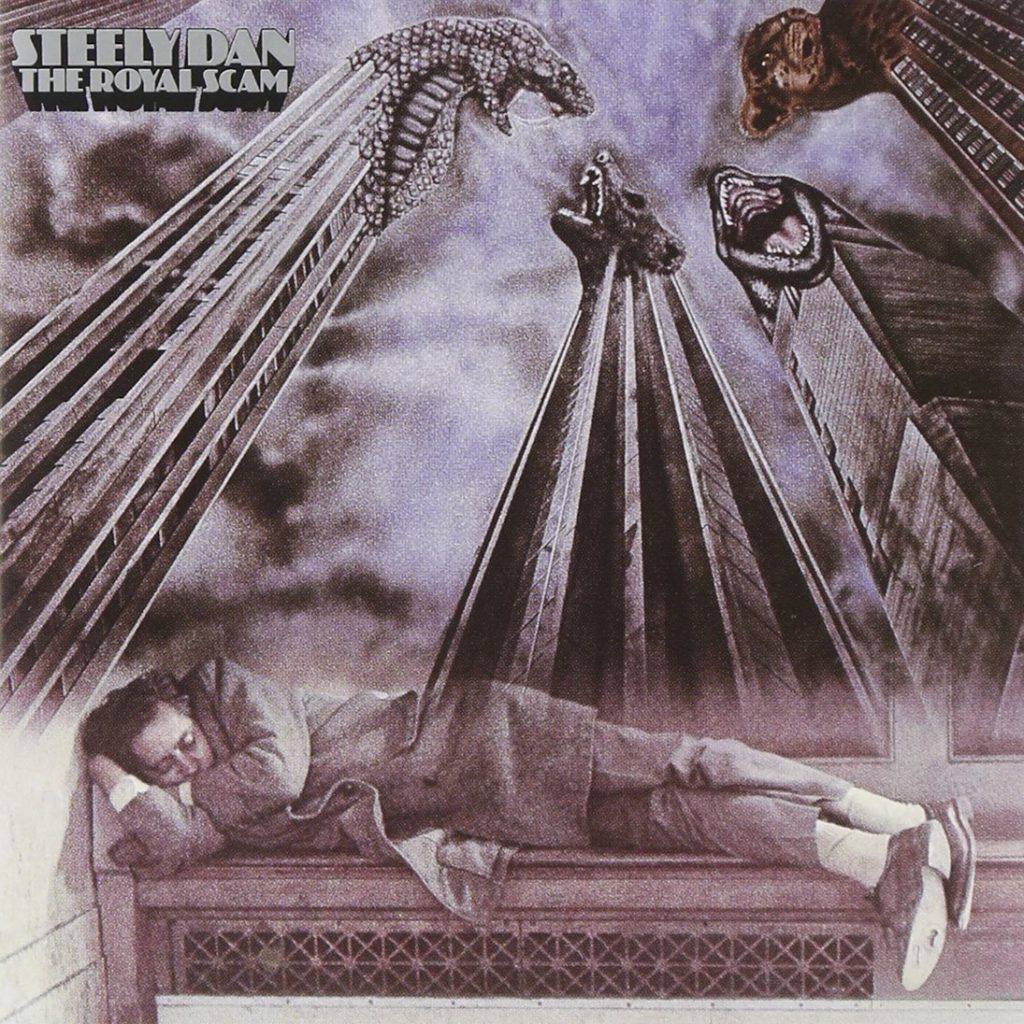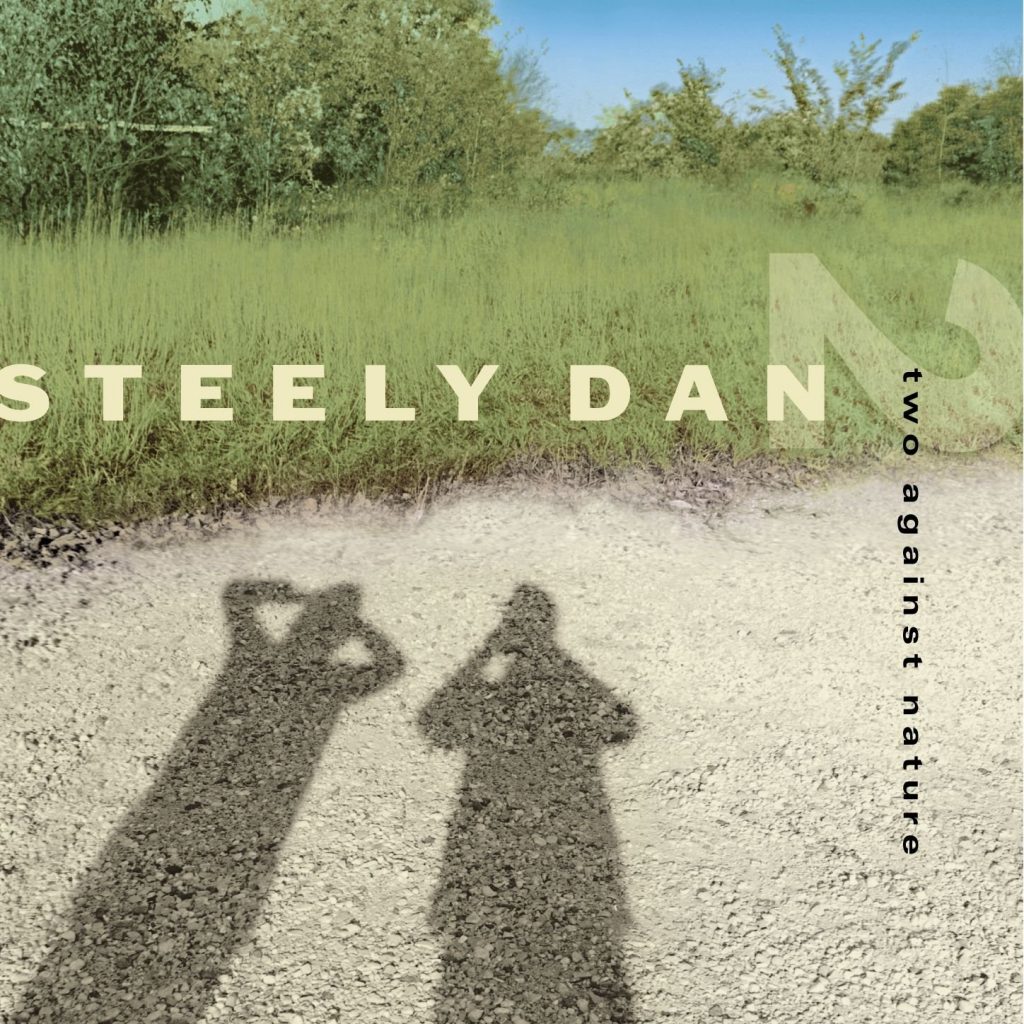A selection of Steely Dan songs that have meaning to me and have stuck with me through the years, appearing frequently on mix tapes and playlists. Not necessarily stuff you’ll find on an artist’s Greatest Hits collection.
Turn That Heartbeat Over Again Steely Dan’s debut album, Can’t Buy a Thrill, was released at the end of 1972. It made an impression with two hit singles ‘Do It Again” and “Reelin’ In the Years,” but there were a lot of good songs on the album–in fact, there really weren’t any bad ones. Many have a similar mid-tempo, electric piano-stoked songwriter rock vibe that may have made them difficult to distinguish from each other. Donald Fagen had doubts about his vocal abilities, especially live, which led him to hire vocalist David Palmer. Palmer sang lead on the group’s other popular song from the album, “Dirty Work” and a non-LP single, “Dallas” as well as offering backing and supporting vocals on most other songs. On this, the last track from the album, Walter Becker joins in with supporting vocals as well. Robert Christgau had this to say about the album: “Think of the Dan as the first post-boogie band: the beat swings more than it blasts or blisters, the chord changes defy our primitive subconscious expectations, and the lyrics underline their own difficulty—as well as the difficulty of the reality to which they refer—with arbitrary personal allusions, most of which are ruses.”
Showbiz Kids Countdown to Ecstasy turned away from the warmer aspects of Can’t Buy a Thrill, and a decision was reached that Fagen would be the group’s vocalist from here out. Fagen’s voice was the perfect vehicle for the more cynical turn their songwriting was taking. The sounds are a little jazzier as well, with the songs having actual arrangements. Fagen and Becker wrote these songs to be played by the band live, and they take on a certain energy from that. “Show Biz Kids” is a bluesy grind punctuated by Rick Derringer’s steel guitar and one of Fagan’s best rhymes: “While the poor people sleepin’/with the shade on the light/while the poor people sleepin’/all the stars come out at night.”
King of the World Also from Countdown to Ecstasy, the track is a message sent out to any survivors of a (presumably nuclear) holocaust. It’s a masterful lyric, written from the perspective of the tough survivor, yet it is all about reaching out to people in order to just do the normal things you used to do. It’s musically exhilarating as well, with Fagen’s soaring synthesizer interlocking with the various guitarists’ simultaneous improvisation. As the album’s last song it’s lyrically disconcerting but musically very compelling.

Night By Night On Pretzel Logic Steely Dan started to bring in session musicians, but they were used sparingly and to provide additional voices, like the horn arrangement on this track. It’s a solid rock number with some scorching rock guitar playing punched up by the crisp horn arrangement. Christgau again weighed in as a fan, referring to Fagen and Becker as “the real world’s answer to Robert Hunter and Jerry Garcia.” I think he may have been on to something because across nine studio albums they recorded they created a mythology of hipsters, grifters, lowlifes, musicians, gunslingers, counterculture types, druggies, glamorous divorcees and other outsiders that still attracts music fans.
Your Gold Teeth II I know, you’re thinking ‘only one track from Katie Lied?’ Yes, the band’s fourth album contained several classics in the Steely Dan canon, including “Black Friday,” “Bad Sneakers, “Dr. Wu,” “Any World That I’m Welcome To.” All worthy songs. But ultimately I always end up feeling a bit like Katy Lied was marking time for the band, by now officially a duo accompanied by studio musicians whose fit with the finished project was of supreme importance. This song is just a fascinating little number with strong piano and a lilting 6/8 meter. We just don’t get to appreciate Fagen’s piano work enough on these songs, and this one gives us a nice hearing. The lyrics are really cryptic on this one, but they make an odd kind of sense—“throw out your gold teeth and see how they roll.” It should be pointed out that this song is named after “Your Gold Teeth” on the Countdown to Ecstasy album and uses a similar lyric (‘do you throw out your gold teeth/do you see how they roll”), but seems otherwise unrelated.
The Caves of Altamira The Royal Scam was the warm-up album for Aja in that it presented the finished Steely Dan project. Fagen and Becker now utilized a bevy of studio musicians, using each musician for a specific purpose, frequently on one specific track. The results were noticeable and gorgeous and not yet formulaic. What’s interesting about the actual Caves of Altamira is that after their discovery in 1880 as the first prehistoric cave paintings in Europe there was a campaign to discredit their age on the basis that Paleolithic humans lacked the capacity for abstract thought. By 1902 a number of similar sites had been discovered and their prehistoric origins were verified. This song is about memory and the loss of innocence and the lyrics are pretty great: ‘Before the fall/when they wrote it on the wall/when there wasn’t even any Hollywood.’ Oh, and that’s John Klemmer’s shimmery tenor sax solo that sounds so good.

The Royal Scam Somehow this track always stands out in my mind as some kind of grand social statement, perhaps the biggest Steely Dan ever made. It’s about some immigrants, perhaps from the Carribean, arriving in New York City and getting involved in the general grift that goes on out on the street and in the underworld. And maybe because the cover image of a man in a suit sleeping on a park bench reminds me of Wall Street traders, this song seems to have something to do with a kind of boiler room scenario and the ultimate discovery that things are no different in NYC, in the USA, than anywhere else in the graft-laden world: ‘See the glory/of the royal scam.’ Walter Becker discussed in an interview the way the group’s ambiguous lyrics can offer a different meaning to different listeners: “If we were to tell you what that song meant we would be doing a disservice to the song and we would always be lending credence to the notion that in order to enjoy the song you have to know exactly what it means, Or that it does mean exactly one thing. And it doesn’t really. None of those things are true.”
Home At Last There isn’t really a track that isn’t heard much from Aja, but the least heard track is probably “I Got the News.” Still, “Home At Last” is often kind of taken for granted–‘Oh, it’s the Ulyssses song.’ But it’s another solid horn chart for the band with Bernard Purdie and Chuck Rainey laying down the groove and Larry Carlton on guitar. “You think you’ve heard this one before,” says Fagen’s narrator before deciding he’ll forgo his Penelope and retsina (wine) to return to the high seas: “So long hey thanks my friend/I guess I’ll try my luck again.”
Third World Man There are as many interpretations of the lyrics here as Steely Dan fans, but the general texture of them is ever more familiar in this era of American mass shootings. What’s rather odd about it is its mellow groove–not mellow so much as resigned. It ends Gaucho, the last Steely Dan album for twenty years, on a sigh rather than any kind of victorious note. The song was supposedly recorded under a different title (possibly ‘Were You Blind That Day’) during sessions for another album–usually thought to be Aja but also suggested as Katy Lied. It ended up on Gaucho because the final track that Becker and Fagen had recorded, “The Second Arrangement”, was accidentally ruined by an engineer. Though the duo has referred to “The Second Arrangement” as the best thing they ever recorded, they did not attempt it a second time, probably because Fagan was left to finish the album alone due to a variety of issues with Becker (heroin addiction, death of girlfriend, car accident). So “Third World Man” was pulled out of the vaults, new lyrics were written and Larry Carlton recorded a new guitar solo, generally acknowledged as one of his best and most emotional solos on a Steely Dan record. People forget that Gaucho was considered a major disappointment after Aja, largely because Fagen and Becker’s famous cynical streak had bubbled over into genuine dislike for their rogues’ gallery of characters, and the compassion and thoughtfulness that this song shows also points to its being from a different period. It’s not really characteristic Steely Dan, but it sticks with you forever.

West of Hollywood In 2000 Steely Dan suddenly came back with Two Against Nature, a solid album that nonetheless marked a different approach for the band. The album won four Grammy awards, including Album of the Year, which is odd considering the songs aren’t much different than the stuff they’d been doing before. The overall sound was still sharp and punctuated with studio musicians, but the vibe was looser. While some musicians were brought in for a track or two, most played on significant portions of the album. Guitarist Jon Herrington was brought in, and he continued to work with the band on their next album Everything Must Go as well as touring with the band both before and after Walter Becker’s death. Ted Baker played Fender Rhodes and acoustic piano on a number of tracks (including this one–Fagen plays the organ), and Chris Potter was the group’s saxophonist de jour, playing solos on three songs. “West of Hollywood” is a typical Fagan/Becker lyric about the denizens of the West coast, but it bites a little less than the lyrics on Gaucho (as do most of them). It could have clocked in at a bit over four minutes, but an equal amount of time is granted to Potter to play a lengthy solo through to the end of the track. Two Against Nature was produced by Becker & Fagen, the first time they had self-produced a Steely Dan album. The sound is closer and tighter than that used by longtime producer Gary Katz and marked the sound the band would adopt in the studio and live going forward. Listeners were familiar with the overall sound because both Fagen and Becker’s solo albums had been produced by the duo and sounded very much like Two Against Nature.

Much overlap with my faves – Night By Night! Home At Last! – but I would have to have FM in my ten!
Hey, Jeremy. Thanks for being a reader and for commenting as well. I do like FM–it’s like an Aja bonus track, so good.